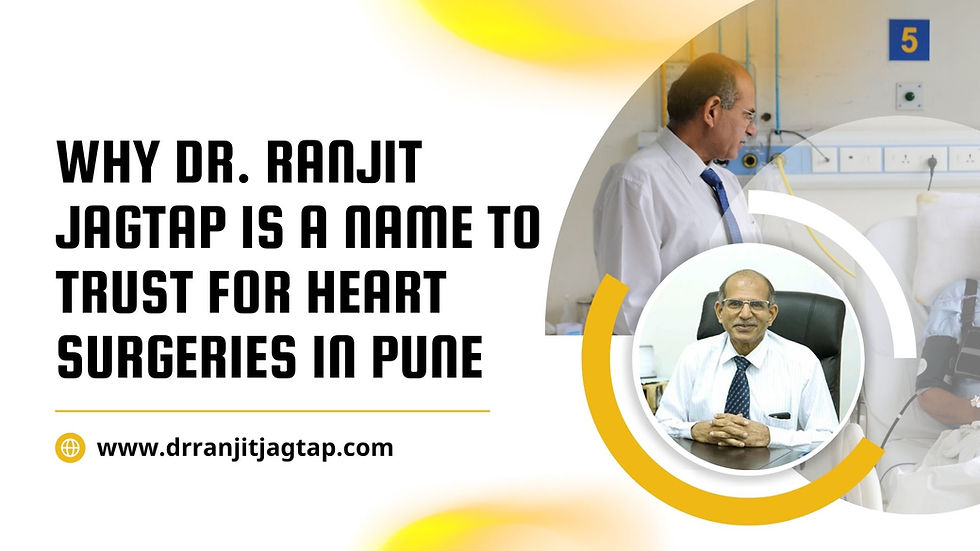Who Is At Risk for Heart Disease? - Dr. Ranjit Jagtap
- drranjitjagdap
- Oct 11, 2023
- 4 min read

Heart disease, also known as cardiovascular disease, is the leading cause of death worldwide. This silent killer claims millions of lives each year, making it essential to understand who is at risk for heart disease and how we can take preventive measures. While genetics play a role in determining our risk, lifestyle choices and habits are equally crucial. In this blog, we will delve into the various factors that contribute to heart disease risk, offering valuable insights and guidance for maintaining a healthy heart.
Age and Gender
One of the first factors to consider when assessing the risk of heart disease is age. As we age, our risk of heart disease increases. In fact, men over the age of 45 and women over the age of 55 are more likely to develop heart disease. This is partly due to the natural ageing process, which can cause arteries to become less flexible and more prone to plaque buildup. However, heart disease can affect individuals of any age, and lifestyle choices can significantly impact this risk.
Gender is another important consideration. Historically, heart disease has been perceived as a predominantly male condition, but it is a leading cause of death for both men and women. Women tend to develop heart disease about a decade later than men, but it is equally deadly. It is crucial for women to be aware of their risk and take proactive steps to protect their heart health.
Family History
A strong family history of heart disease can increase an individual’s risk. If close family members, such as parents or siblings, have had heart disease, especially at a young age, it is essential to be vigilant. Genetic factors can predispose you to heart disease, but remember that genetics are not destiny. Lifestyle choices can help mitigate these genetic risks as per Dr. Ranjit Jagtap.
High Blood Pressure
High blood pressure, or hypertension, is a major risk factor for heart disease. It places added stress on the arteries, causing them to narrow and become less flexible. This, in turn, increases the likelihood of plaque buildup. Regular monitoring of blood pressure and, if necessary, appropriate management through medication and lifestyle changes is crucial in reducing the risk of heart disease.
High Cholesterol
Cholesterol is a fatty substance found in the blood, and high levels of low-density lipoprotein (LDL) cholesterol can contribute to the formation of plaque in the arteries. Monitoring cholesterol levels and making dietary adjustments are essential for reducing heart disease risk. A diet rich in saturated and trans fats can increase LDL cholesterol levels, while a diet high in fibre and omega-3 fatty acids can help lower them.
Diabetes
Diabetes, particularly type 2 diabetes, is closely linked to heart disease. High blood sugar levels can damage the arteries over time and increase the risk of heart disease. It is crucial for individuals with diabetes to manage their condition effectively through medication, diet, exercise, and regular check-ups.
Smoking
Smoking is one of the most significant modifiable risk factors for heart disease. The chemicals in tobacco smoke can damage the heart and blood vessels, leading to the formation of plaque and blood clots. The good news is that quitting smoking at any age can significantly reduce heart disease risk. It’s a decision that brings immediate health benefits says Dr. Ranjit Jagtap Clinic.
Obesity
Obesity and excess body weight are linked to numerous health issues, including heart disease. The extra weight puts a strain on the heart, increases blood pressure, and can lead to other risk factors like diabetes. Maintaining a healthy weight through a balanced diet and regular exercise is a fundamental step in reducing heart disease risk.
Physical Inactivity
Sedentary lifestyles have become increasingly common in today’s society, and they are a significant contributor to heart disease risk. Regular physical activity strengthens the heart, improves circulation, and helps maintain a healthy weight. Aim for at least 150 minutes of moderate-intensity exercise or 75 minutes of vigorous exercise each week.
Unhealthy Diet
A diet high in processed foods, saturated and trans fats, salt, and added sugars can contribute to heart disease. A heart-healthy diet, on the other hand, emphasizes fruits, vegetables, whole grains, lean proteins, and foods rich in fibre and essential nutrients. Reducing sodium intake and limiting alcohol consumption are also essential components of a heart-healthy diet.
Excessive Alcohol Consumption
While moderate alcohol consumption may have some cardiovascular benefits, excessive drinking can increase the risk of heart disease. If you choose to drink, do so in moderation. For women, this means up to one drink per day, and for men, up to two drinks per day.
Stress
Chronic stress can contribute to heart disease by increasing blood pressure and potentially leading to unhealthy coping mechanisms, such as overeating or smoking. Learning to manage stress through relaxation techniques, exercise, and social support can help reduce this risk factor.
Sleep Apnea
Sleep apnea is a condition characterized by interrupted breathing during sleep and is associated with an increased risk of heart disease. Treating sleep apnea can improve overall health and reduce the risk of heart-related complications.
Conclusion
According to Dr. Ranjit Jagtap News, Heart disease is a complex condition with various risk factors, many of which are modifiable through lifestyle changes. Understanding who is at risk for heart disease is the first step in taking proactive measures to protect your heart health. Regular check-ups, a heart-healthy diet, physical activity, and avoiding smoking and excessive alcohol consumption can significantly reduce the risk of heart disease. It’s never too late to make positive changes and prioritize your heart health, so start today for a healthier, happier tomorrow.



Comments